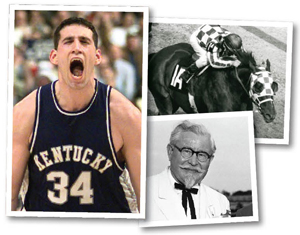February 4, 2026
Triangle Park tree planting, 1982
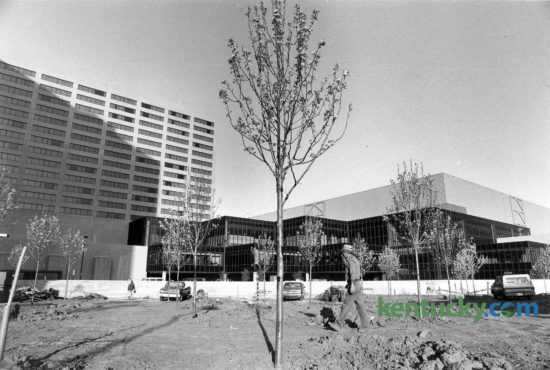
Trees being planted in Lexington’s Triangle Park, April 28, 1982. Scheduled for completion by mid-June, the park still needed finishing touches including grading, grass, lighting and brick work. The park opened July 2, 1982 before an estimated 4,000 people who oohed and aahed as the lights and fountains came on. The project, on the 1.4-acre slice of land bordered by West Main Street, Vine Street and Broadway, once seemed dead because the Urban County Government didn’t have enough money to build it. But private citizens got together, formed Triangle Foundation, raised $1 million and with the government’s help help finished the park in time for the city’s Fourth of July celebration. Developer Alex G. Campbell, who led the foundation, said none of those who began work on the park “two years ago could have foreseen the development of this tract into the park we see today.” He predicted that the park would become a symbol of Lexington as “the arch is to St. Louis and the space needle is to Seattle.” Years after Rupp Arena was finished in 1976, the area that became the park was a parking lot. Today the park, which features fountains in a series of “water steps”, is smoke free and hosts a number of events from the city’s Christmas tree lightning to Fountain Films on Friday. In the background of the image is Rupp Arena, the Lexington Center and the Hyatt Regency hotel. Photo by Charles Bertram | staff file photo
Continental Inn construction, 1965
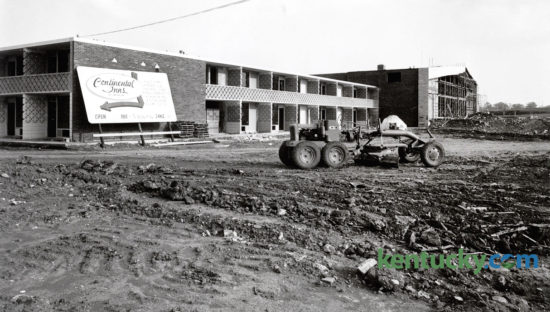
Construction of the Continental Inn, near the intersection of New Circle and Winchester roads, Sept. 12, 1965. Completed at a cost of $2 million, the hotel had a cocktail lounge, dining room, convention facilities, a private club and a swimming pool. It was undoubtedly Lexington’s most colorful hotel, hosting the most varied assortment of characters. The Continental Inn was always a bit over the top, hosting Elvis conventions and psychic fairs and square dancing conventions. If you were seeking a tattoo expo or regional darts tournament in Lexington and didn’t know where it might wind up, the smart bet was always the Continental Inn, which covered just under six acres with 319 rooms and don’t forget the indoor pool with a lit-up Statue of Liberty replica peering over. The Rotary Club met there for years, too, and in 1976 then-California governor Ronald Reagan presented the group’s high school academic awards to Lexington students. Actor Lee Majors learned to drive an 18-wheeler in the parking lot there while filming the movie “Steel” (1979) at the Kincaid Towers. The Continental Inn stopped accepting guests on August 31, 2005 and most of the hotel was demolished in 2007. The last remaining building, the Conference Center, was torn down in 2016. Today part of the site is an Infiniti car dealership. Click here to see a typical room at the hotel from 2002. Herald-Leader staff file photo
City-wide cleanup, 1950
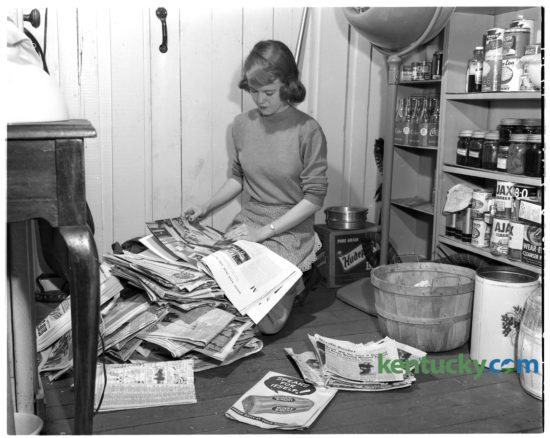
Mrs. James Mahan sorts out unwanted papers during the beginning of Lexington’s city-wide, two-week annual cleanup campaign in April 1950. The campaign, under guidance of the Chamber of Commerce and various safety leaders, featured both city and county trucks hauling rubbish away. In addition to the cleaning, safety was also being demonstrated to housewives across the county. Day-to-day safety measures such checking for worn or damaged electrical cords or proper fuse replacement was shown. Some of the items on Mahan’s shelf include Ajax cleanser, canned oysters, blackberry and pear preservers, empty coke bottles, canned vegetables and spices, including a container of Kroger cinnamon. The house where this picture was taken, 430 Columbia Ave., is now a parking lot for the William T. Young Library on the University of Kentucky’s campus. Published in the Lexington Leader, April 14, 1950
Lexington rainbow mural, 1983
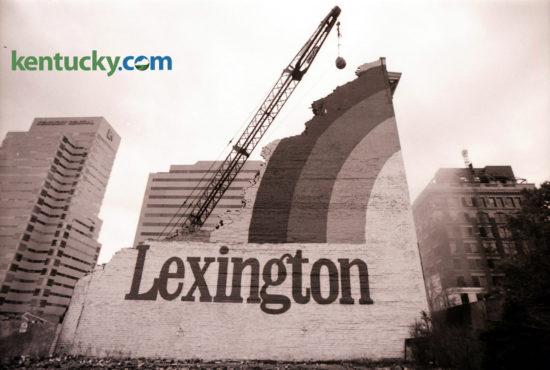
The Lexington rainbow mural was about all that remained of the former Philip Gall & Son sporting goods building at 230 West Main St. in downtown Lexington, as workmen took down the last wall on October 26, 1983. The space was being cleared for a downtown retail and office complex called the Lexington Galleria, to be developed by the Webb Companies. This and the adjacent World Coal Center never happened. Instead the Lexington Financial Center (commonly known as the Big Blue Building) was developed. The site shown here is now the location of its parking garage. Photo by Ron Garrison | Staff
McAdams & Morford Drugs on Main Street, 1939
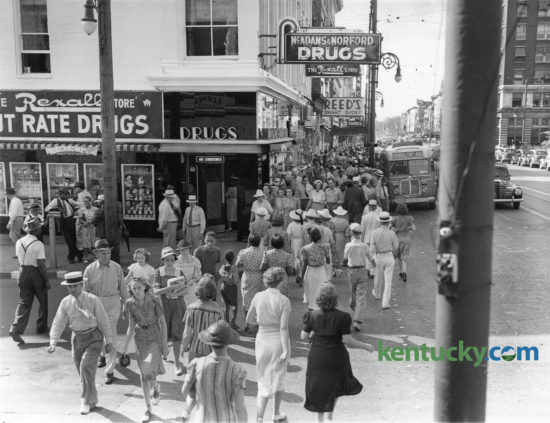
Looking west down Lexington’s Main Street at Upper Street, 1939. The building at the corner is the McAdams & Morford Building. The drug store occupied the corner space from 1898-1994. The three-story building was completed in 1849 and housed Melodeon Hall, one of Lexington’s first large theaters on the second floor. The building was added to the National Register of Historic Places in 1973. In 2017 a car wreck damaged the entrance to Harvey’s restaurant at the corner of what was the drug store and uncovered elaborate arches that were part of the Venetian Renaissance cast-iron façade added to the building in the 1850s. Today the corner location is Harvey’s Bar & Hugo’s Ultralounge. Herald-Leader archive photo.
Ross Perot campaigns in Kentucky, 1992
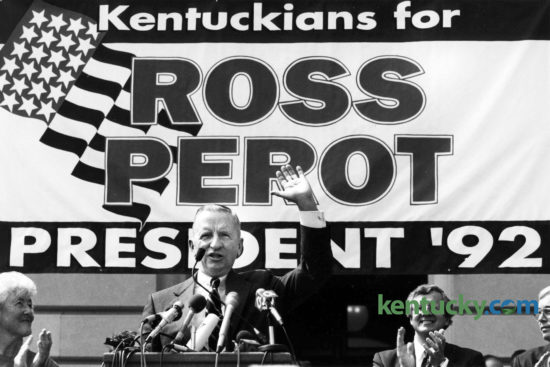
Undeclared, independent candidate for United States President H. Ross Perot thanked supporters May 21, 1992 on the Capitol steps for turning in more than 40,000 signatures to put his name on the Kentucky ballot. About 1,500 supporters turned out in the hot sunshine as the the colorful, self-made Texas billionaire brought his grass-roots campaign to Kentucky. Perot, who twice ran for president as a third-party candidate, died early Tuesday at his home in Dallas. His 19% of the vote in 1992 stands among the best showings by an independent candidate in the past century. Perot was in Frankfort just before Kentucky’s primary – a primary he wasn’t on the ballot for since he was an undeclared, independent candidate. In that week’s primaries in Oregon and Washington, Perot received significant numbers of write-in votes. But write-in votes are not allowed in Kentucky’s primary. Pam Kleier, a spokeswoman for Kentuckians for Perot, told the crowd, “I’ve also been asked to tell you that when you go to the primaries on Tuesday, you have the option to vote uncommitted. Please do that.” But Perot said that how to vote was up to the individual and that he had not discussed Kleier’s comments with her before she spoke. Afterward, at a news conference, Perot took a few shots at the George Bush administration and Vice President Dan Quayle. Earlier in the week, Quayle criticized the TV character Murphy Brown for having a child out of wedlock. “I just thought it was goofy,” Perot said of Quayle’s comments. “When you think of the real problems that face this country, well suddenly it’s ‘Murphy Brown,’ which is a fictional, 30-minute show on television.” Perot said his running mate will be “so well qualified that my volunteers may want to reverse the ticket.” He criticized the Bush administration for fighting with Congress. “We have gridlock in Washington. Nothing happens,” he said “They get up every morning, throw rocks at one another all day, blame one another all day for whatever the problem of the day is, whether it’s ‘Murphy Brown’ or Los Angeles. In terms of getting things done compared to the crowd that’s there now, in my sleep I think I could be competitive.” During the 1992 campaign, Perot spent $63.5 million of his own money and bought 30-minute television spots. He used charts and graphs to make his points, summarizing them with a line that became a national catchphrase: “It’s just that simple.” Photo by Charles Bertram | staff
Central Baptist hospital construction, 1952
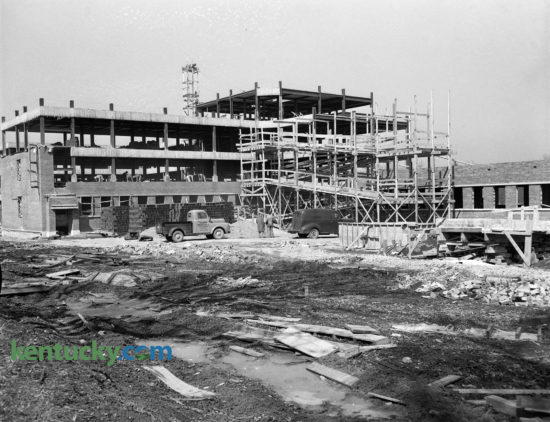
Construction of Central Baptist hospital on Nicholasville Road in March of 1952. At a cost of $2.6 million, construction took six years, hampered by fundraising efforts that lasted nearly a decade. The hospital was part of a three-phase construction program to add 750 more beds to the state. In addition to Central Baptist, Kentucky Baptists constructed Western Baptists in Paducah and an addition to Kentucky Baptists hospital in Louisville. The H-shaped, 108,000 square-foot structure on what was then called Nicholasville Pike, had 173 beds, 25 bassinets, five operating rooms and two delivery rooms. The hospital opened its doors on May 12, 1954. Gifts from 35 Central Kentucky stores and organizations were presented to the first baby delivered at the hospital, a daughter born to Mr. and Mrs. Carl Shannon. Today the hospital goes by the name Baptist Health Lexington. Click here to see another image from our archives of the hospital. Published in the Lexington Herald March 8, 1952. Herald-Leader Archive Photo
Moonshine, beer, whisky raid, 1956
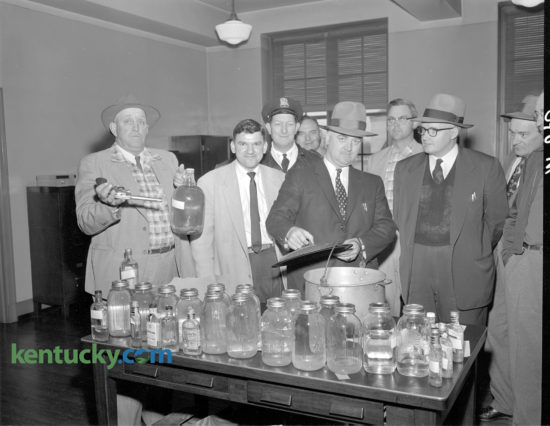
On April 7, 1956, officers raided ten Lexington establishments in a mass clean-up of places believed to be illegally possessing and selling beer and whisky. Moonshine, beer, whisky and a .38 caliber pistol were among the items confiscated by the four state, 13 local and five federal officers who participated in the operation. Some of the participants in the raid included, from left, front row, ABC Agent Roger Crouch, Federal Agent Stanley Kaminski, Maj. Wallace McMurray, and Detective Sgt. Gilber Cravens, of the Lexington police department; Back row, Lexington Patrolman Charles Henry, ABC Agent Mark Holmes and Federal Agent Paul Tarter. Click here to see other photos from our archives of moonshine raids. Herald-Leader Archive Photo
Lexington’s second LaRosa’s restaurant, 1975
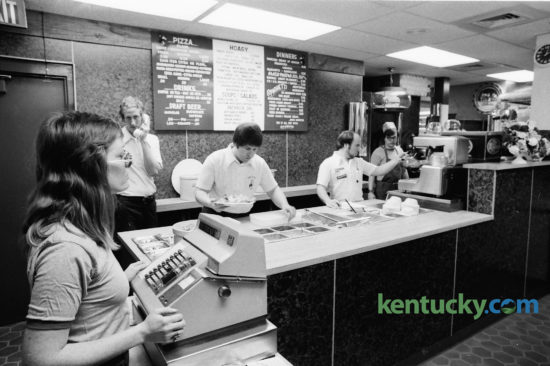
Lexington’s second LaRosa’s Restaurant location opened in the Coliseum Plaza, corner of Rose Street and Euclid Avenue in early February 1975. The popular Cincinnati-based restaurant featured big backed booths and stucco walls. Preparing to serve customers were, from left, Diana Cagle, Jim Hoff, manager, Lance Churchill, co-owner, and Kirk Seeberger, co-owner. The first Lexington LaRosa’s location opened in Woodhill Shopping center in 1974. Both locations were closed before 1979. A new Lexington location will open today on Richmond Road. It will be the second-largest LaRosa’s in the chain, behind only the original. Photo by Frank Anderson | Staff
Gay Brewer Jr. during match at Picadome, 1950
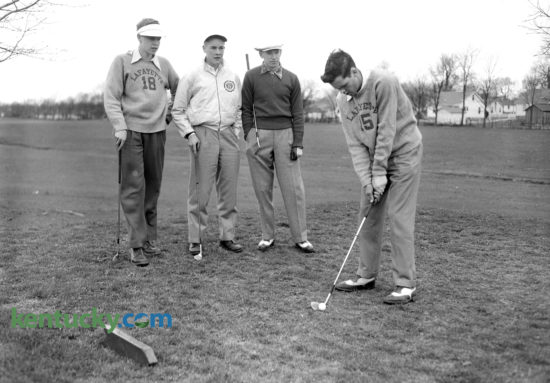
Lafayette’s Gay Brewer Jr. tees it up while from left, teammate Bob Davis and University of Kentucky golfers Don Smith and Chester Riddle look on during a match, April 11, 1950 at Picadome Golf Club. The Generals, the defending state high school champions, edged out UK’s freshman squad in the season opener for both teams. Brewer’s two-under-par 70 was the day’s low score. Also playing in the match for Lafayette was future Kentucky governor John Y. Brown Jr. Brewer, the individual state titlist and National Junior Amateur champion at the time of this photo, won the Kentucky Open the following year and turned professional in 1956. He won 11 times on the PGA tour, including the 1967 Masters. He also played for victorious U.S. Ryder Cup teams in 1967 and 1973. Brewer, who retired from the Champions Tour in 2000, died in 2007 after battling cancer. The golf course in Lexington where he learned to play was renamed the Gay Brewer Jr. Course at Picadome. Here is another picture from our archives of Brewer. Herald-Leader archive photo

